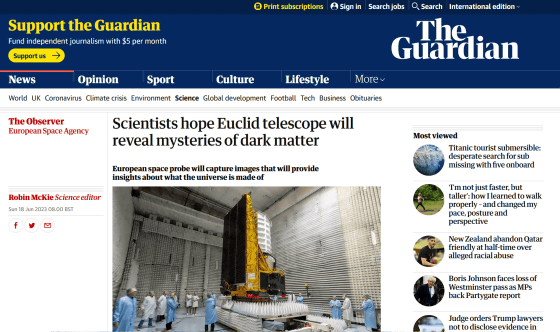How does the 'Euclidean Space Telescope', which is expected to unravel the mystery of dark matter, investigate dark matter?

Scientists hope Euclid telescope will reveal mysteries of dark matter | European Space Agency | The Guardian
https://www.theguardian.com/science/2023/jun/18/scientists-hope-euclid-telescope-will-reveal-mysteries-of-dark-matter

Dark matter exists, although it cannot be directly observed optically, based on the research results that ``the mass estimated from observable matter does not have enough gravity to hold a star in a rotating galaxy.'' An unidentified substance that is believed to exist. According to the mainstream hypothesis, about 25% of the universe is composed of dark matter, 70% is dark energy , which is thought to be accelerating the expansion of the universe, and the remaining 5% is known matter such as atoms. It has been.
As for dark matter, ' Isn't it an elementary particle that can move to the 5th dimension ? ' While various theories have been submitted, such as ``Dark Matter does not exist'', there are also researchers who claim that ``Dark Matter does not exist'', and the identity of Dark Matter is still shrouded in mystery.
Why do researchers claim that 'dark matter does not exist'? -GIGAZINE

Meanwhile, ESA is trying to unravel the mystery of dark matter and dark energy using the Euclid Space Telescope, which has invested 1 billion euros (about 155 billion yen). Andy Taylor , professor of astrophysics at the University of Edinburgh, UK , said, ``If the nature of dark matter and dark energy remains a mystery, we cannot say that we understand the universe. is very important,' he said.
Originally, the Euclid Space Telescope was scheduled to be launched in 2022 using a Russian Soyuz rocket . However, due to Russia's invasion of Ukraine, the plan was postponed as ESA terminated the contract with Roscosmos , a Russian space development agency, and signed a new contract with SpaceX led by Earon Mask. The launch of the Euclid Space Telescope using SpaceX's Falcon 9 rocket is scheduled for July 1, 2023.

After the launch, the Euclid Space Telescope will move to
Dark matter is likely to be composed of particles that do not emit, reflect, or absorb light, and even high-performance space telescopes cannot directly observe it. However, the Euclid Space Telescope is expected to be able to understand dark matter by capturing the effect of `` gravitational lens '' caused by the mass of dark matter.
Gravitational lensing is a phenomenon in which light is refracted when passing through the gravitational field of a substance with a large mass, and the progress of light emitted from stars and galaxies is affected by this phenomenon. Because dark matter is thought to have mass, it is possible to analyze the gravitational lensing effect of dark matter's mass on the basis of millions of images of galaxies taken by the Euclid Space Telescope.
'The gravitational lensing that dark matter produces will tell us what it's made of, whether it's made of light particles or very large particles,' said Mathilde Jusak , a professor at Durham University . If so, they produce different types of lenses, and this information will help us search for dark matter particles on Earth.'

Related Posts:
in Science, Posted by log1h_ik







